To compensate for the real life events that we are all missing so much, the VideoVortex community gathers during a hybrid event that happens both online and in the courtyard of John Cabot University in Rome. Organized and hosted by Donatella Della Ratta and Albert Figurt (in Rome) and Andreas Treske and Geert Lovink (online), we will switch between a conversation robot, Zoom, a drone and the obligatory online video screening in an experimental setup that will try to beat the overall online fatigue. Remember Malta, let’s bring on new VideoVortex gatherings! In the meanwhile, let’s preserve the spirit, see you all thereWhat is online video today, fifteen years into its exponential growth? What started with amateur work of YouTube prosumers has spread to virtually all communication apps: an explosion in the culture of mobile sound and vision. Now, in the age of the smart phone, video accompanies, informs, moves, and distracts us. Are you addicted yet? Look into that tiny camera, talk, move the phone, show us around — prove to others that you exist! Founded in 2007 by the Amsterdam Institute of Network Cultures, Video Vortex is a lively network of artists, activists, coders, curators, critics, and researchers that deals with all the facets of both politics and aesthetics of online video.
Calculating Control Symposium (11)
The location and architecture of Haus der Statistik demonstrates the two-sided nature of the science of cybernetics: On the one hand, the potential of a new organizational model, and on the other, the risks associated with its use as a powerful instrument for surveillance and control. These ambivalent uses of cybernetics are explored in examples from the socialist political regimes of the past as well as the capitalist network society of today. A second focus of the symposium is the consideration of netart and its aesthetic expressions that reflect the cybernetic conditions of the internet, while also being dependent on them.
Video Vortex XII proceedings: art, archive, algorithms, activism
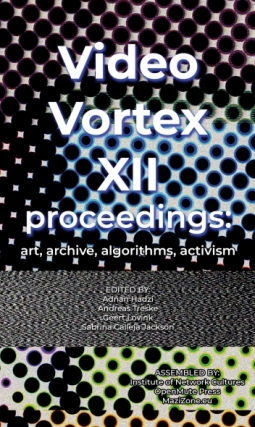
Video Vortex, an artistic network concerned with the aesthetics and politics of online video, gathered again in Malta for a two-day conference. We were in particularly focussing on bringing new research, theory and critiques of online video– in addition to questions around its integration with social media – to Malta. These proceedings are an edited collection of assembled and annotated video essays living in two instantiations: an online version – located on the web at https://vv12.org, and an offline version – stored on a server inside a VHS case.
(re)programming: Accountability
Truth is hardly making it under an information ecosystem defined by speed, exploitation, opacity and inequality. But journalism is not in danger, it is just happening somewhere else. Eyal Weizman founded Forensic Architecture to test a methodology for analyzing the occupation of Gaza as a crime scene, using buildings as witnesses, satellite data as evidence and models and artificial intelligence as tools for the testing and verification of new hypotheses. This exercise of counter-forensics has been replicated and improved over the years to provide new evidence against official narratives in international human rights courts. It also prompted a new genre of journalistic procedurals and a community of practice that, under the moniker Investigative Commons, seeks to confront the disinformation machine of “counter-factual” neo-fascist groups by socializing the development and deployment of “counter-forensic” evidence. Initiated by Forensic Architecture, FORENSIS and the European Center for Constitutional and Human Rights (ECCHR), Investigative Commons includes documentary superstar Laura Poitras/Praxis Films, Bellingcat, Mnemonic and HKW, among others.
CTM & TM: for refusal 2021 Highlights
The Research Networking Day (RND) is an exchange platform for students and researchers from different graduate and postgraduate programmes traversing the fields of audio, arts, media, design, and related theoretical disciplines. This RND edition will take place in collaboration with Leuphana University, the German Association for Music Business and Music Culture Research (GMM), and Humboldt-Universität zu Berlin.
Sisters With Transistors
Morphine x Beirut
Rethinking Music Ecosystems
CTM Cyberia
Studio & CTM Present: CQ5
Arts Formation
MusicMakers Hacklab: Off the Fovea
Apotome
Club Matryoshka
Refuse To Be Human !Mediengruppe Bitnik 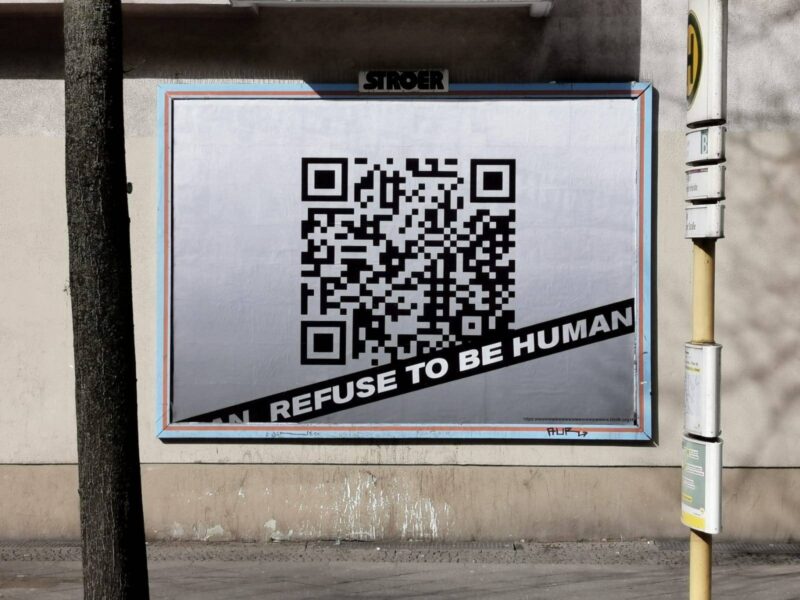 !Mediengruppe Bitnik, Refuse To Be Human, 2021 !Mediengruppe Bitnik, Courtesy of the artists / OPEN BerlinEver wanted to surf the web as a bot? Ever wondered what a bot gets to see online that you don’t? In their latest work, !Mediengruppe Bitnik allows you to become a Yandex bot to find out. The number one search engine in Russia, Yandex uses web crawlers that extensively scrape the web for content for their search engines. Only what the bots see is indexed, for discovery later by users searching on Yandex. Refuse to be Human allows you to install a web extension that changes your browser’s user agent to match that of the Yandex bot, giving you access to what is referred to as the ‘grey web’ – a layer of content only visible to bots, and access to websites and archives usually paywalled. Download the browser extension here Firefox Chrome Produced in collaboration with transmediale and Open.Berlin .!Mediengruppe Bitnik (read – the not Mediengruppe Bitnik) are contemporary artists working on, and with, the Internet. Their practice expands from the digital to physical space, often intentionally applying loss of control to challenge established structures and mechanisms. !Mediengruppe Bitnik’s works formulate fundamental questions concerning contemporary issues. In the past they have been known to subvert surveillance cameras, bug an opera house and broadcast its performances outside, send a parcel containing a camera to Julian Assange at the Ecuadorian embassy in London, and physically glitch a building. Their works have been shown internationally, most recently in exhibitions at CAC Shanghai, LOAF Kyoto, Annka Kultys Gallery London, House of Electronic Arts Basel, Aksioma Ljubljana, Kunsthaus Zurich, FACT Liverpool, Onassis Cultural Center Athens, Public Access Gallery Chicago, Nam June Paik Art Center South Korea, Shanghai Minsheng 21st Century Museum, The Pushkin Museum of Fine Arts Moscow, Beijing Contemporary Art Biennial and the Tehran Roaming Biennial.
!Mediengruppe Bitnik, Refuse To Be Human, 2021 !Mediengruppe Bitnik, Courtesy of the artists / OPEN BerlinEver wanted to surf the web as a bot? Ever wondered what a bot gets to see online that you don’t? In their latest work, !Mediengruppe Bitnik allows you to become a Yandex bot to find out. The number one search engine in Russia, Yandex uses web crawlers that extensively scrape the web for content for their search engines. Only what the bots see is indexed, for discovery later by users searching on Yandex. Refuse to be Human allows you to install a web extension that changes your browser’s user agent to match that of the Yandex bot, giving you access to what is referred to as the ‘grey web’ – a layer of content only visible to bots, and access to websites and archives usually paywalled. Download the browser extension here Firefox Chrome Produced in collaboration with transmediale and Open.Berlin .!Mediengruppe Bitnik (read – the not Mediengruppe Bitnik) are contemporary artists working on, and with, the Internet. Their practice expands from the digital to physical space, often intentionally applying loss of control to challenge established structures and mechanisms. !Mediengruppe Bitnik’s works formulate fundamental questions concerning contemporary issues. In the past they have been known to subvert surveillance cameras, bug an opera house and broadcast its performances outside, send a parcel containing a camera to Julian Assange at the Ecuadorian embassy in London, and physically glitch a building. Their works have been shown internationally, most recently in exhibitions at CAC Shanghai, LOAF Kyoto, Annka Kultys Gallery London, House of Electronic Arts Basel, Aksioma Ljubljana, Kunsthaus Zurich, FACT Liverpool, Onassis Cultural Center Athens, Public Access Gallery Chicago, Nam June Paik Art Center South Korea, Shanghai Minsheng 21st Century Museum, The Pushkin Museum of Fine Arts Moscow, Beijing Contemporary Art Biennial and the Tehran Roaming Biennial.
For Refusal
Marshall McLuhan Lecture 2021
TM & CTM recordings
YouTube channel
Arcturus
A new project by the name of Arcturus will be premiering on the 8th of January, 2021. It is set to close the “Away From The Comfort Zone” series of projects.The name, Arcturus, is also that of a red giant seen in the Northern Hemisphere of Earth’s sky – the brightest star in the constellation Boötes, more commonly known as The Herdsman.Arcturus is fronted by none other than Carlo Muscat and Keith Farrugia – both incredible musicians known especially for their incandescent music. This project is set to infuse the electronic realm with some of the finest jazz tunes – and will provide listeners with a more intimate, improvisational side to music.
Flagged for Political Speech
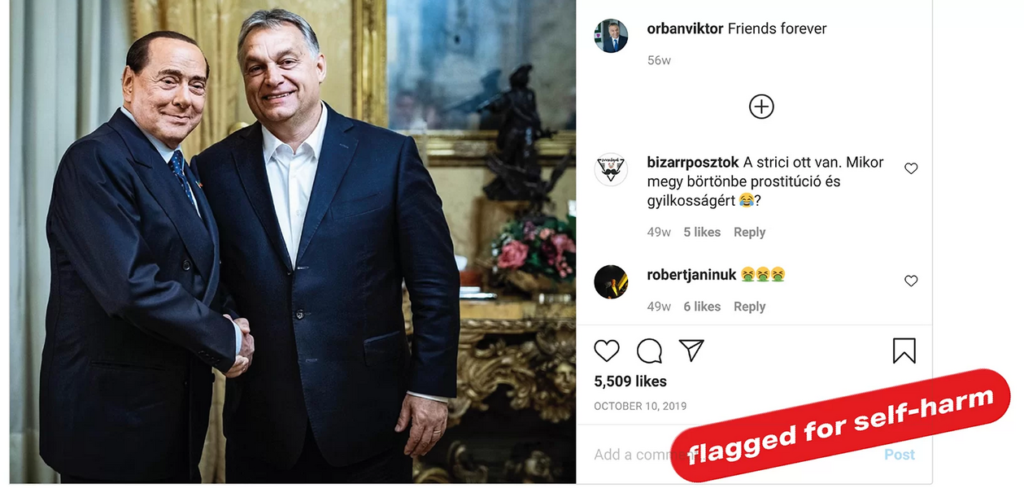
What do algorithms see when they look at your social media profile? Are you a good provider of content? And what exactly is good? What does the algorithmic view on your social media profiles say about you?
Analyses of social media profiles are employed in an increasing number of real-world transactions. From border control to job applications, social media profiles are used to assess the threat-levels of a candidate and verify their suitability to enter a country or organisaton.
Many of these social media checks are done automatically by algorithmic entities. How and what do these algorithms assess exactly? And what do their assessments look like?
To find out, !Mediengruppe Bitnik used Ferretly, an automated online service used by Human Resources Professionals to evaluate candidates’ social media profiles. Ferretly uses algorithms trained on keywords and image recognition to sift through 7 years of social media history. The service evaluates candidates publically available social media posts on Twitter, Instagram and Facebook, analyzing original posts, reposts, replies, and likes. Additionally, Ferretly will assess any news items they can find.
With their service, Ferretly promises to reduce the risk of letting a person displaying toxic behaviour into your organisation or country. Toxic behaviour is defined in 11 risk categories, from hate speech, political extremism, drug-related content to explicit images and toxic language. The publicly available posts are also used to look at the sub-text of each post: the candidate’s attitude towards the event or situation they are posting about is rated as positive, negative or neutral. Each candidate is judged according to these per-defined flags and sentiment points and given a social media score which rates them as fit or unfit for entry.
!Mediengruppe Bitnik ran the social media profiles of the leaders of each of the 27 EU member states through the service. Bitnik then interpreted the results of the analysis and used this as the basis to devise a customized sweatshirt for each of the 27 profiles.
Each shirt shows Bitnik’s interpretation and visualization of the Ferretly ratings. Besides their social media scores for different parameters, each of the shirts publicly displays a number of flagged posts which were rated by Ferretly as toxic and the reason for this rating. Depending on the report, the shirts contain more or less data. Usually more posts and data meant a worse social media rating by Ferretly.
Like the clothes we wear, our social media profiles have become the carrier of our identities. These online identities are used more and more by the gatekeepers of institutions, countries and organisations to verify that we are worthy of access.
Remote Chaos Experience (rC3)
The Wandering Tower – Mahala Festival
The Mahalla Festival 2020 was scheduled to take place in Arbil, Iraq, with screenings, performances, talks, round tables and concerts. The festival wanted to bring together artists, academics, institutions and stakeholders from different fields and different backgrounds to support an intercultural understanding in times of increased mobility and search for identity.Under the critical circumstances and in the light of the objectives of the destabilization in Iraq we had to cancel the Mahalla festival in January 2020. The new escalation of violence in Iraq and Syria is more than a slap in the face of its citizen.We were planning to shift the Mahalla Festival 2020 to Cyprus. But then in February not online China but the whole world was confronted with the COVID-19 pandemic which changed the way we communicate and keep our creative narration alive for the time being.We are now globally faced with the measures that are necessary to control the pandemic and staying in self isolation to slow the spread of the pandemic. Following the global lockdown all cultural and community events and any kind of mobility are suspended and the economy stands still. Many cultural actors and creative initiatives try to survive not only artistically but also existentially. Under these circumstances the Mahalla Festival 2020 will take place as a remote festival to overcome self-isolation, demobilization and paralysis.
On December 26 & 27, 2020, the Unfinished Art Space based in Malta is organizing a 2-days exhibition entitled “Us”- Clubbing Report, with photos from artist Charlene Galea.

Curated by Margerita Pulè – who has participated in the Mahalla Festival 2018 with the installation, The Cement Bakery at the Palazzo in Zabbar –, the exhibition “Us” brings us close to moments and situations that are made possible by clubs and their atmospheres, the people constituting them and the soundtracks invading our ears.
In a time when clubs all over Europe are closed, artist and photographer Charlene Galea presents the exhilaration, intimacy and beauty of the clubbing scene through 35mm photographs dating from 2012 to 2020 and covering clubbing scenes in Barcelona, Berlin, France, Ibiza, London, Malta, Morocco, the Netherlands, Romania, and Tunisia.
In the 2-day exhibition, the physical and emotional intensity created, transcending generational and social constructs will be documented closely and truthfully, and hopefully make us travel in our memories of warm clubbing nights…
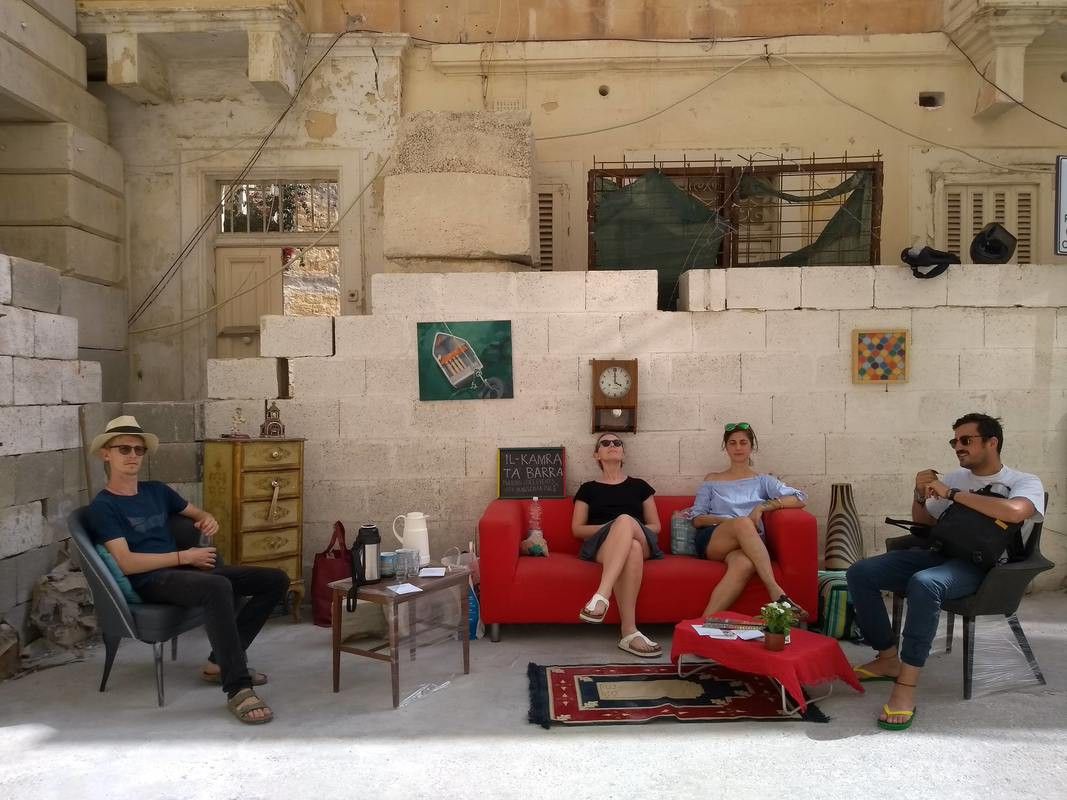
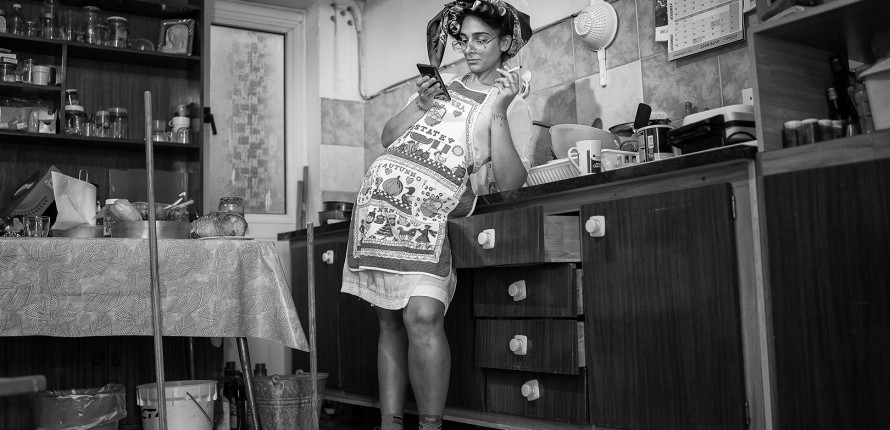
Excerpt from the Mahalla Festival News post: No later than one week ago I was standing in the queue of the KitKatClub in Berlin, not waiting for my turn to enter the dancefloor but standing in line like the others to get a quick-corona-test.
While jumping from one foot to the other, trying to get rid of the cold, I was reading the signs of the Clubcommission Berlin, calling for an equal treatment of the clubbing scene within the cultural area, especially in times of COVID-19. It almost sounded like a manifesto and made me think of these empty spaces and their significance in today’s world.
But Berlin is not the only place where club culture is defended and questioned. Currently active in her hometown in Malta, photographer and performance artist Charlene Galea has been taking photos of the clubbing phenomenon since 2012 and is reminding us of the multitude of experiences one is usually able to live in such a place.
Under the title “Us” Clubbing Report, she will exhibit a selection of these photos on December 26 & 27 in cooperation with the Unfinished Art Space, pointing out how important clubs are for people as spaces of freedom, of movement, of fluid identities…
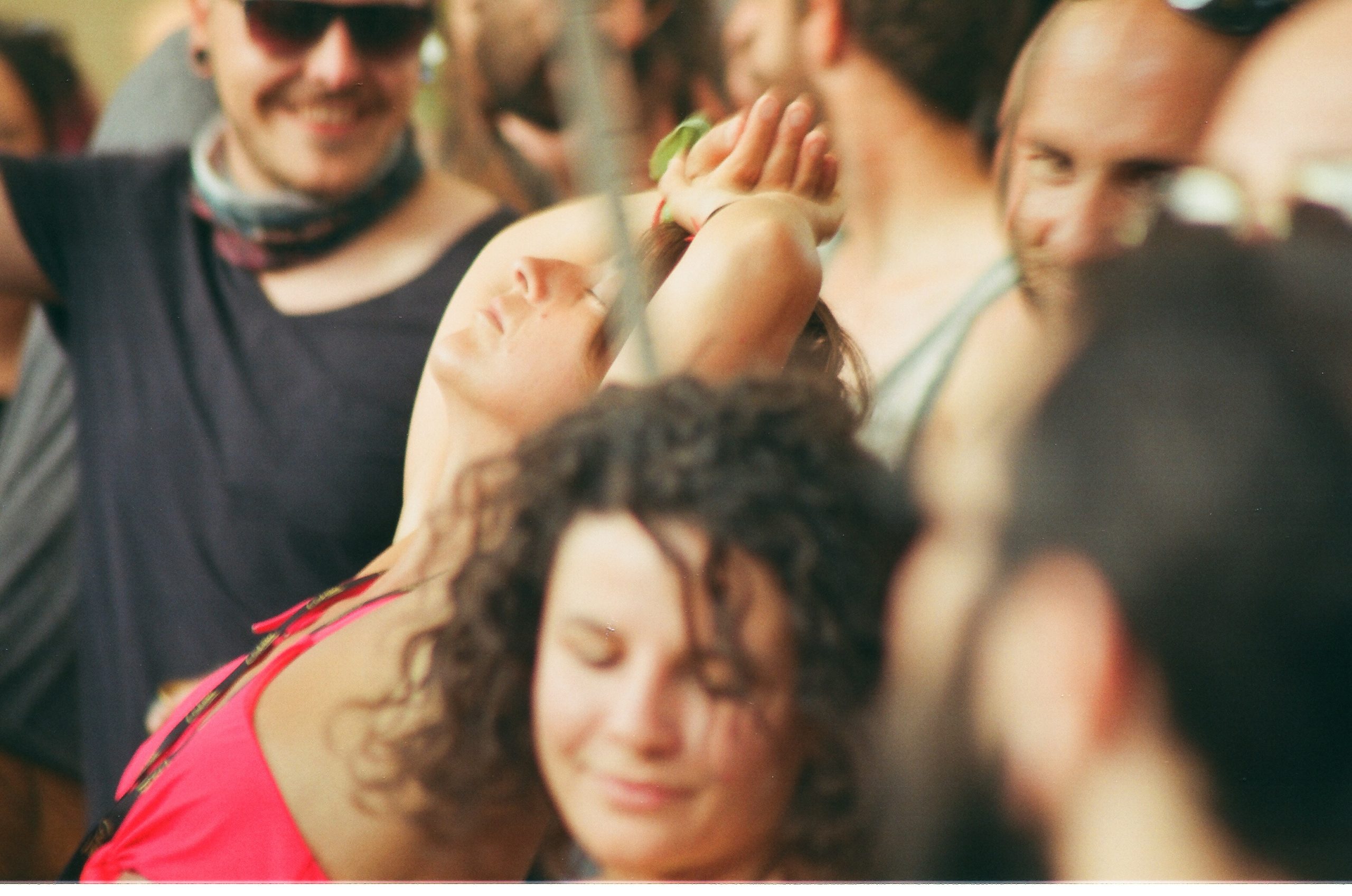
Charlene Galea is a Maltese artist who likes to stand on both sides of the camera. As an observer, particularly in numerous clubs around Europe where she first started to watch human bodies in action, and as a performer, an artistic approach she works with to guide people through concepts, using Instagram “stories” as a medium.
During her time at the London College of Fashion she started taking photos while going to clubs asking herself “Why are they here? What are they doing? Why is this occasion so special?”, while confessing that her favourite spot in clubs is the cloakroom area, a space of transformation where bodies rid themselves of their outer layers before getting on “stage”, a term we both agree upon – clubs are stages of freedom.
This diversified and international “field study” and the three-day takeover of a hotel in Malta this summer – which lead to strong blame from the government regarding COVID-19 outbreak on the island – were the triggers for this exhibition. Never having wanted to publish these images before, in fear of disappearing in the monotony of posts and pictures of weekend parties, “now is the right time”, she says, as clubs have closed again around the world.
Nevertheless, for Charlene Galea this moment of pausing and shutting down is having a positive impact as an anti-capitalistic act, making us aware of the former over-consumption of clubbing experiences. She is aware of what she calls a “loop”, arising when going out to a club: first dressing up, meeting up with friends, getting a drink beforehand etc. A loop that is affecting our club experience. “The hugs could be longer, one could start a conversation with someone who maybe really needs to talk”. We now have some time to think of the value of those spaces in our life and how we want to use them in the future.
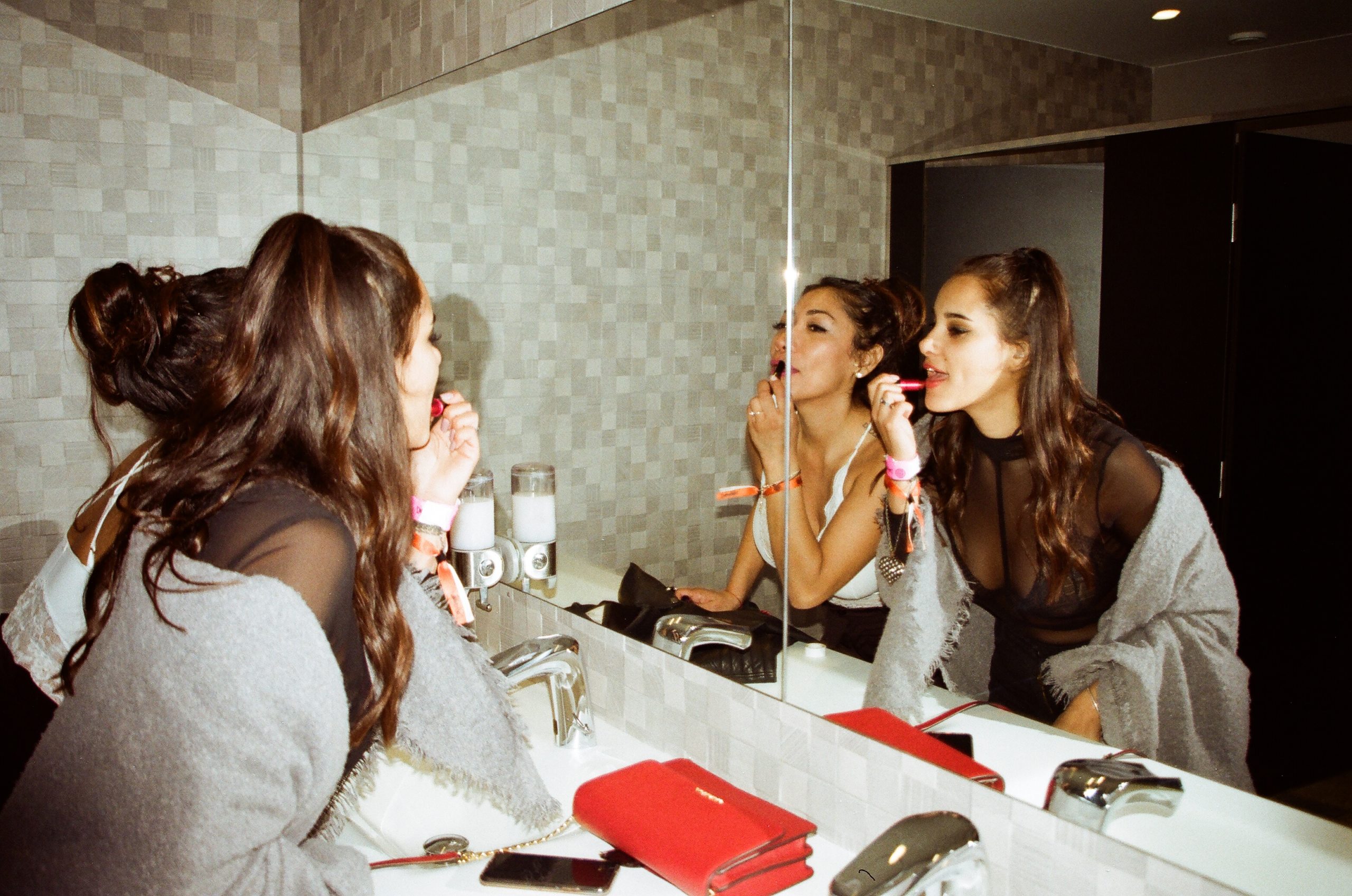
Whilst diving further into our conversation, I was impressed by the multitude of layers she looks at while “analysing” and choosing clubs as a motif for her artistic practice. The clubbing experience is vast, constituted by arrangements made between people before and after, a social experience in itself. The economic aspect also plays a role in her observations as the clubbing industry employs a huge number of staff. A cultural layer also surrounds clubs and their locations.
Indeed, Charlene Galea has been travelling to festivals in foreign countries, realizing that people tend to forget that there is a place outside of the club that can be visited, looked at, interacted with. Instead of consuming the event and flying back to their country the artist invites people to have a look around themselves, to be more aware of their physical presence in a new cultural area.
A section of the exhibition will be dedicated to her travel experiences, juxtaposing photos of parties and of villages she visited.
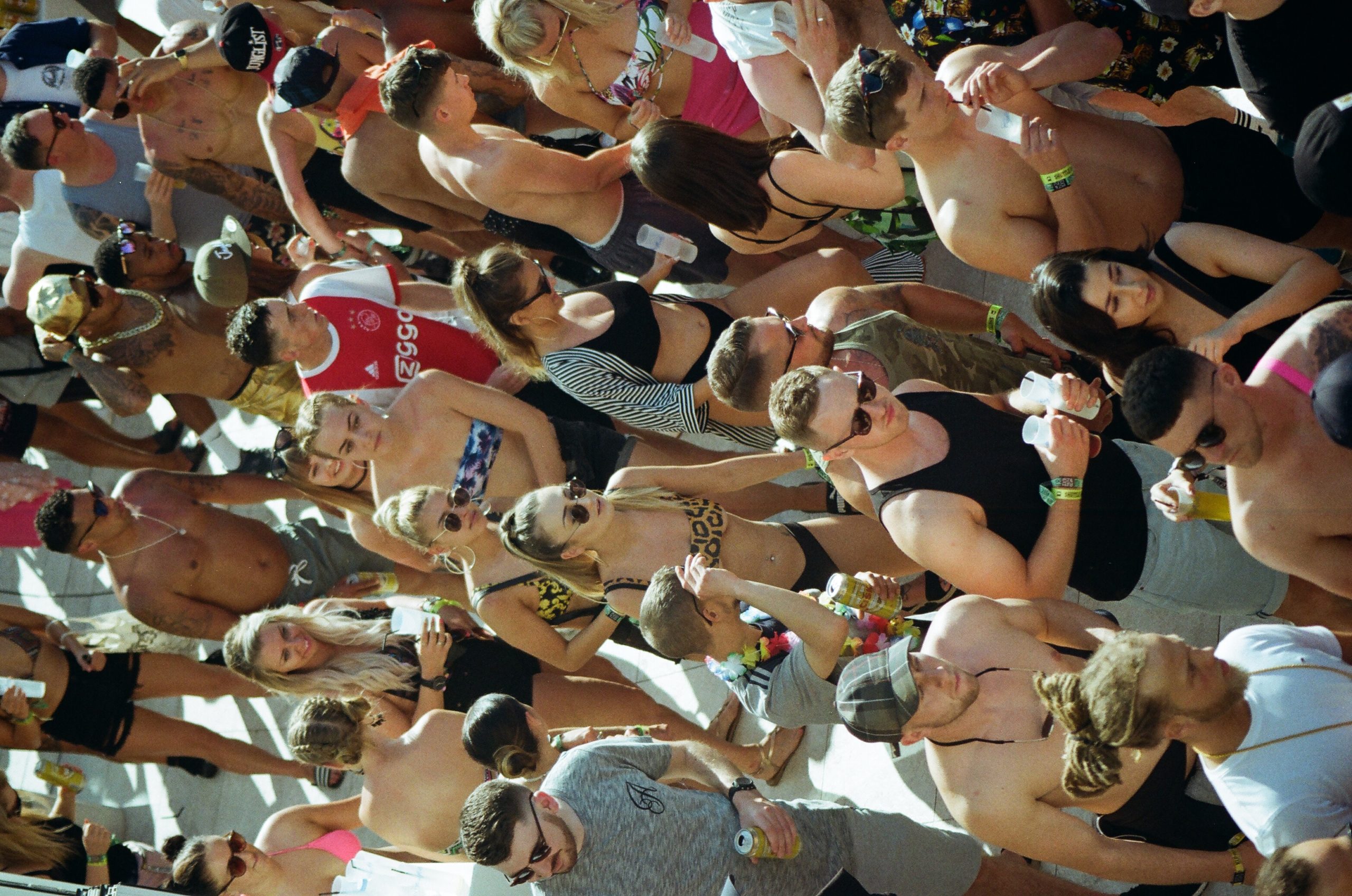
Regarding the way Charlene Galea dives into a topic and deepens concepts and practices under an anthropological and performative eye, it is not a surprise that the exhibition was curated by Margerita Pulè who manages the Unfinished Art Space. In comparison to the commercial art market in Malta, the Unfinished Art Space gives space to political art and concepts creating thoughts, in a more underground way. “It is the right moment to come out with those photos: in a safe space that is not taken for granted”.
The exhibition will be composed of 40 to 50 images organized in 8 different spaces. “Entering at their own risk”, people will have a first insight into the club experience. In a second room, a space will be reserved for pictures of outfits, statements, preparation for the club. The third room will be dedicated to travel experiences in Tunisia, Ibiza, Marseille, and Morocco where globalization has made clubs homogeneous in the inside, standing in stark contrast to the outside world of those cities and countries.
In the kitchen there will be kissing portraits, in the bathroom some shots of girls in club toilets, before walking to the outside area presenting photos of festivals as well as portraits of sleeping people. The 7th room will include intimate photos and the last room will show after party pictures which are, for the artist, always full of surprises.
A travel around times and spaces with colourful flashbacks…
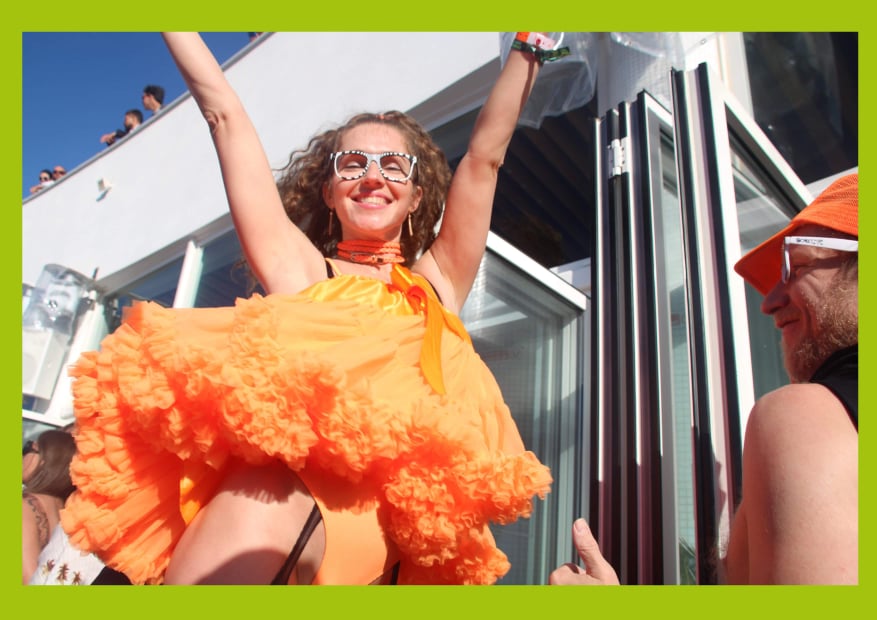
“Probably people will have to queue outside because of the corona rules, but at least it will be a metaphor for the queuing moment when going to a club”, says Charlene Galea as we start shifting our discussion towards her position as an artist in Malta. During COVID-19 times it is difficult to get support from the state as the government ranks artists on a marking scheme which creates a feeling of competition.
“Being an artist in Malta is not so easy”, she states explaining that numerous people criticize her performances and her way of presenting herself on Instagram. A part of the population is still shocked by the clubbing scene, open air parties and liberated bodies.
Women in Malta are also still attached to numerous beauty standards which Charlene Galea tries to overcome through her work, liberating movements when “modelling” herself on her photos. She wants to shoot women as they are, in a more organic way.
Through her Instagram account she already connected to a big network and considers stories as a good way to engage and communicate with her audience, but also to know it and produce art for groups that are interested. “Who is my audience?” is a constant question she asks herself in order to stay flexible and open – surely not a bad quality for artists who today, more than ever, have to adapt to survive and preserve their art in unequal societies.
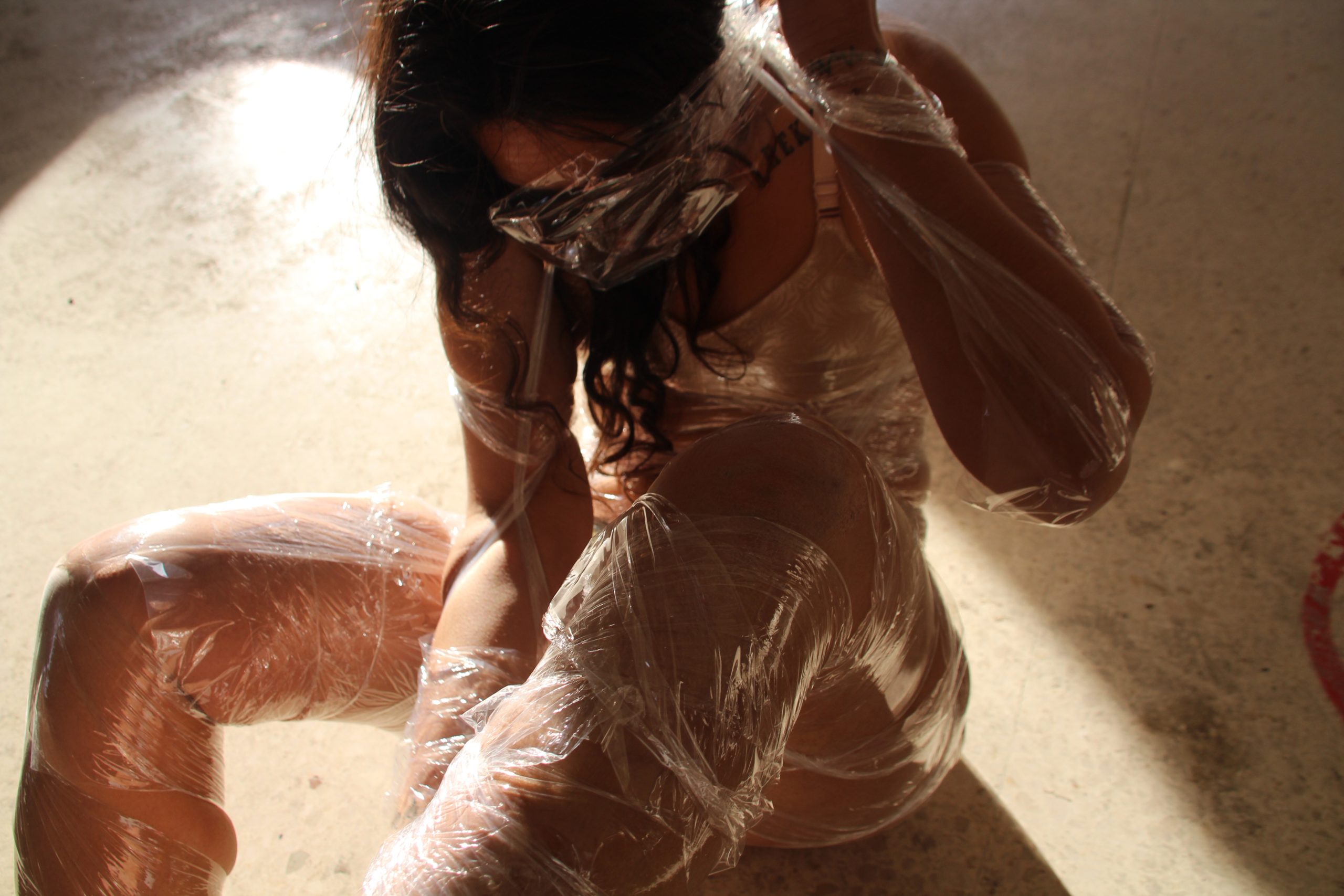
The exhibition “Us” Clubbing Report is part of The Wandering Tower, the 2020 edition of the Mahalla Festival taking place in Istanbul: http://mahalla.inenart.eu/2020/12/01/a-clubbing-report-in-a-world-without-clubs/
You can support Charlene Galea’s work for an artistic surprise in exchange by clicking here.
You Are What You Buy
We took part in the YAWYB workshops. Excerpt from Times of Maltaabout YAWYB: An artistic research project held between 2016 and 2017 questioned the effects of consumption on buyers. This year, a second edition is delving deeper into the subject and is particularly looking at the impact of the COVID-19 pandemic on our production, shopping and consumption habits.
You Are What You Buy (YAWYB) reacts to current issues on consumption and consumerism, offering an alternative artistic experience. The first edition was a year-long transdisciplinary project that departed from a reflection on our need to affirm ourselves as consumers. The research process and final presentation were set in a supermarket in Malta, offering a different possibility of where and how to experience art − away from the art institution.
Since then, the team continued thinking on how they could develop the project further.
“In the wake of the pandemic, it felt like a natural progression to revisit the project − it almost felt like a responsibility not to ignore all the changes in our production, shopping and consumption habits resulting from the impact of the pandemic. This is how YAWYB ‒ A Remote ReVisit came about,” artist Kristina Borg says.
“Also, YAWYB has always anticipated to catalyse change in our production, shopping and consumption habits, specifically inviting us producers and consumers to engage in more intelligent thinking processes while we produce and shop, with the aim of contributing to a new normal that guarantees responsible production and consumption for sustainable cities and communities. And what better time, when we’re affected by the pandemic, to reflect on this?” she continues.
In answering the research question (see box on right) and more, YAWYB – A Remote ReVisit moves outside and beyond the supermarket space to incorporate other spaces and places of production and consumption in our neighbourhoods. These include, but are not limited to, the local grocery store or the mini-market, the open markets, the supermarket, the household store, the clothes store, the coffee place, the restaurant and online platforms.
This second edition focuses mainly on research; however, the outcomes are presented through artistic and creative means.
Similar to the first edition, this second edition also collaborates with a group of community co-creators as well as with service providers. This was done remotely due to the pandemic, hence the ‘remote’ in the title. In the wake of the pandemic, it felt like a natural progression to revisit the project
“With this in mind, it is important to mention that such remote means allowed the project to widen its audience to a European-based one, attracting survey respondents and community co-creators based in Austria, Belgium, France, Germany, Greece, Ireland, Italy, Latvia, The Netherlands, Spain, Switzerland, Turkey and the UK,” Borg enthuses.
“This has also provided a wider spectrum of shared experiences as affected by different degrees and levels of the pandemic in different countries.”
